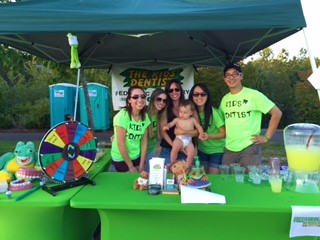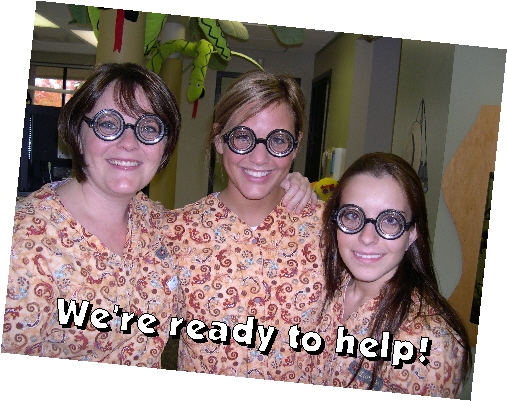


CAN I FILL OUT MY CHILD’S REGISTRATION
FORMS AT HOME?
Of course! You can save time by filling these out at
home. Click HERE for a list of available forms. Completed forms can be brought in, faxed, or mailed to us.
Fax number: (503) 635-0035
Address: 18676 Willamette Dr. Ste. 301, West Linn, OR 97068
WHAT IS A PEDIATRIC DENTIST?
Pediatric dentists are the pediatricians of dentistry. The pediatric dentist has an extra two to three years of specialized training and is dedicated to the oral health of children from infancy through adolescence, including those with special health needs. The very young, pre-teens, and teenagers all need different approaches in dealing with their behavior, guiding their dental growth and development, and helping them avoid future dental problems. The pediatric dentist is well qualified to meet these needs.
WHAT AGE GROUP OF CHILDREN DO YOU TREAT AT THE KIDS’
DENTIST?
All children and teenagers are unique. At the Kids’ Dentist, we have no hard and fast rules. We treat children from infants to late teenagers. Our practice grows with your child and has attractions centered around our "Rainforest Treehouse." We have toys, books, video games, web terminals, and movies that will entertain children, teens, and parents! Your teenager will probably let you know when it is time to graduate to the family dentist.
WHICH INSURANCE PLANS WILL YOU ACCEPT?
The Kids’ Dentist can submit insurance for you if all of the necessary information is received and verified prior to your appointment. Some plans require you to see an in-network or participating dentist; please contact us to see if we participate with your plan. With some plans we are a specialist and a referral is required from your general dentist. If you have questions, you are best served to call the customer service number on your insurance card or contact your Human Resources department at the place of employment.
WHEN SHOULD MY CHILD FIRST SEE A DENTIST?
The American Academies of Pediatric Dentistry and Pediatrics recommend that children see a pediatric dentist when the first tooth appears, or no later than his/her first birthday. Early examination and preventative care will protect your child’s smile now and in the future.
DO'S AND DON'TS - HOW DO I PREPARE FOR MY CHILD'S DENTAL VISIT?
DO schedule the first visit early in the day. We like to see young patients when they are rested, and the appointment will not conflict with mealtimes or naptime.
Young children usually are more fresh and cooperative in the morning. Ask for an appointment time that coincides with other young patients who can serve as role models.
DO dress up. Nothing will increase the expectation of a pleasant experience as much as "getting ready" in fancy clothes.
DO read some of our SUGGESTED BOOKS AND PLAY some online games with your child.
DON'T give your child instructions on how to behave (such as telling the child not to cry, sit still in the chair, or to be "good") in the office.
DON'T overdo your preparation. Tell your child about the dental visit the night before, treating it as a highlight of the next day.
DON'T use words around your child that might cause unnecessary fear or tell "scary" stories about going to the dentist.
Words such as "needle", "shot", "pull", "drill" or "hurt" may cause preventable anxiety and make the first dental visit more difficult for your child.
We make a practice of using words that are pleasant and non-frightening to your child while explaining what we are doing in "kid-friendly" terms.
DO YOU ALLOW PARENTS TO COME BACK WITH THEIR CHILDREN?
Parents are invited back to observe and interact during the initial exam and checkups. We have a designated parent chair from which you can observe treatment. During restorative treatment of cavities, parents are invited to observe from behind the child in the treatment area. This arrangement allows the doctor and staff to communicate with your child directly without distractions or safety concerns. Over time, we hope to bring your child back by themselves to better establish your child's trust and independence. During sedation and general anesthesia treatment, no parents are allowed to observe due to safety concerns. Finally, if you expect your child to do well and enjoy their visit to our office, chances are they will do just that!
WHAT DENTAL PROBLEMS COULD A BABY HAVE?
The most important reason for an earlier visit is a practical prevention program. A big concern is nursing or baby bottle tooth decay. Your baby risks severe decay when he or she nurses continuously from the breast or from a bottle of milk formula or juice during naps or at night. The earlier the dental visit, the better the chance of preventing dental problems. Children with healthy teeth chew food easily, learn to speak clearly and smile with confidence. Start your child now on a lifetime of good dental habits.
WHY ARE
THE PRIMARY OR “BABY” TEETH SO IMPORTANT?
It is very
important to maintain the health of the primary teeth. Neglected cavities
can and frequently do lead to problems which affect developing permanent teeth.
Primary teeth, or baby-teeth, are important for (1) proper chewing and eating,
(2) providing space for the permanent teeth and guiding them into the correct
position, and (3) permitting normal development of the jaw bones and muscles.
Primary teeth also affect the development of speech and add to an attractive
appearance. While the front 4 teeth last until 6-7 years of age, the back
teeth (cuspids and molars) are not replaced until age 10-13.
CAN THUMB-SUCKING OR PACIFIER USE BE HARMFUL FOR MY CHILD'S TEETH?
Thumb and pacifier sucking habits that go on for a long period of time can create crowded, crooked teeth and bite problems. If a child is still sucking thumbs or fingers when the permanent teeth arrive, your pediatric dentist may recommend a habit appliance or other strategies. With a few proven strategies, most children can stop these habits early and on their own.
WHAT ARE DENTAL SEALANTS AND HOW DO THEY WORK?
Sealants are clear or shaded plastic applied to the teeth to prevent cavities. Sealants fill in the grooved and pitted surfaces of the teeth, which are hard to clean, and shut out food particles that could get caught, causing cavities. Fast and comfortable to apply, sealants can effectively protect teeth for many years.
IS MY CHILD GETTING ENOUGH FLUORIDE?
Children can receive fluoride by ingesting a recommended amount and/or applying fluoride topically. The answer to this question varies based on the fluoride content in your community water and the age of your child. We would be happy to discuss fluoride with you.
HOW SAFE ARE DENTAL X-RAYS?
Dr. Yip is particularly careful to minimize the exposure of child patients to radiation. Lead body aprons and shields are used to protect your child, and our digital X-ray equipment requires only a fraction of the radiation energy of that used with traditional films. With these contemporary safeguards, the amount of radiation received in a dental X-ray is extremely small and far exceeds the risk of undetected dental disease if images are omitted.
WHAT CAUSES CROWDED TEETH AND OTHER ORTHODONTIC PROBLEMS?
Crooked teeth and bite problems are common and may occur for many reasons. Orthodontic problems may be genetic or may arise from dental injuries, the early loss of primary teeth, and habits like thumb-sucking. Dr. Yip can help your child transition from oral habits that could potentially create orthodontic problems.
SCHEDULE AN Copyright
© 2018 The Kids' Dentist, PC. All rights reserved.
18676 Willamette Dr., West Linn, Oregon 97068
503-697-4746, www.oregonkidsdentist.com
APPOINTMENT
HOME

